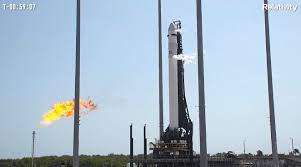CAPE CANAVERAL, Fla. (AP): A rocket made almost entirely of 3D-printed parts remained on the pad Wednesday after its debut launch attempt was aborted at the last minute.
California-based Relativity Space was attempting to launch the rocket to orbit from a former missile site at Cape Canaveral Space Force Station. There was no immediate word on when the company might try again.
On-board flight computers halted the countdown with just over a minute remaining because of a temperature issue with the rocket’s upper stage. Mission Control decided to fix the problem and try again before the launch window closed, but in the end called it quits for the day.
It’s a relatively small rocket, just 110 feet (33 meters), and won’t be carrying anything for this test flight except for a memento: the first metal 3D print from the company’s printers.
About 85% of the rocket, named Terran, is made of 3D parts printed at the company’s factory in Long Beach, California, including its engines. Relativity Space aims to increase that percentage on its future versions.
SpaceX’s Falcon rockets have been flying with 3D-printed parts for years, but not nearly to the extent of Relativity Space’s new rocket.
Relativity Space said its rocket is the largest 3D-printed object to attempt a launch.
Businessman Mark Cuban of TV’s “Shark Tank” was among the early investors in the company.






